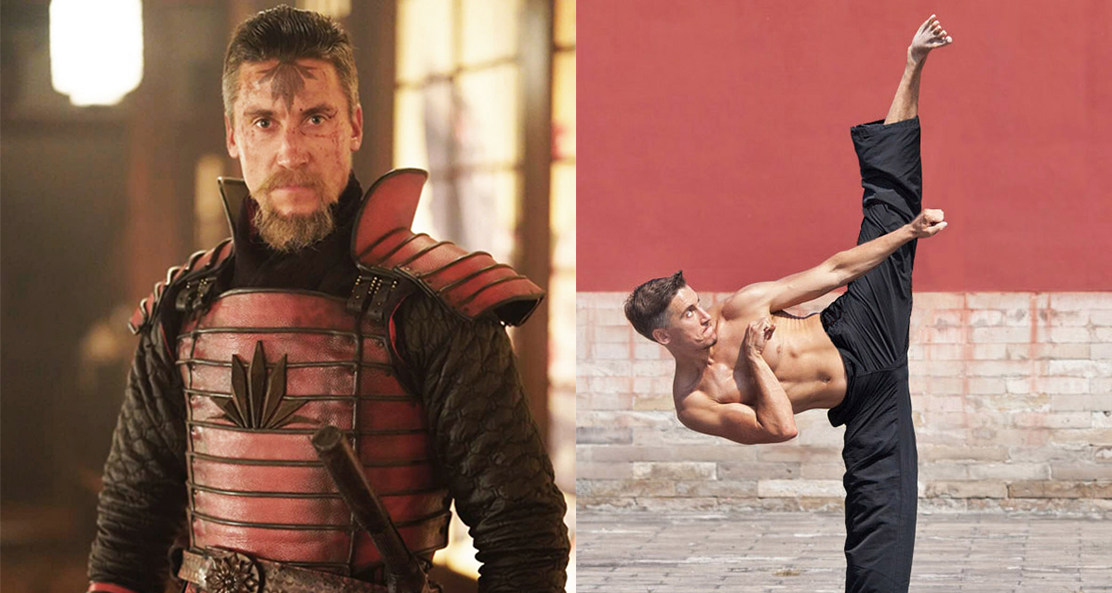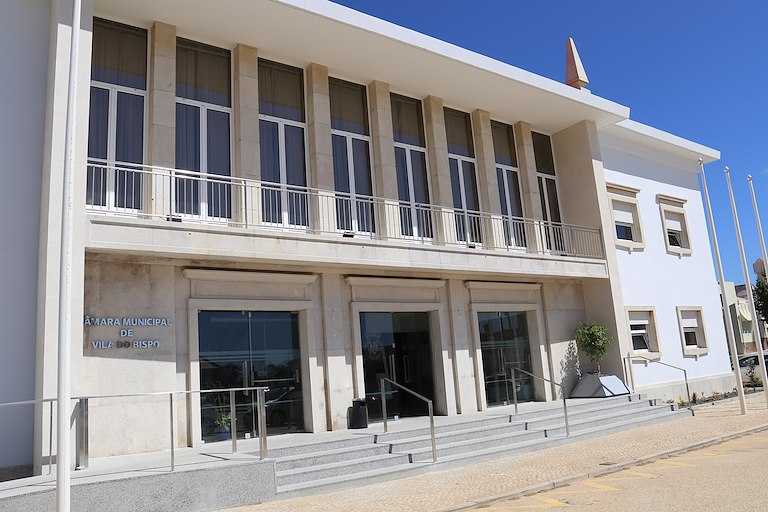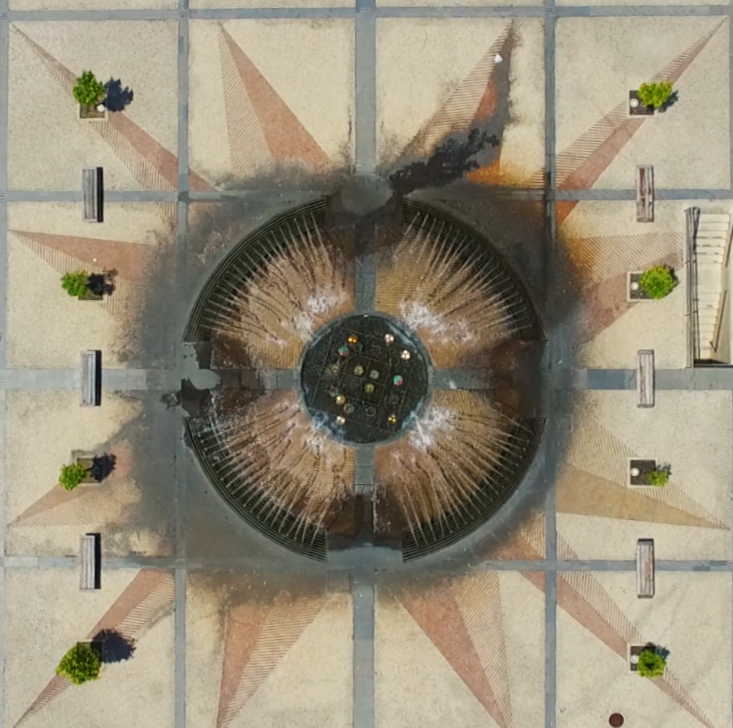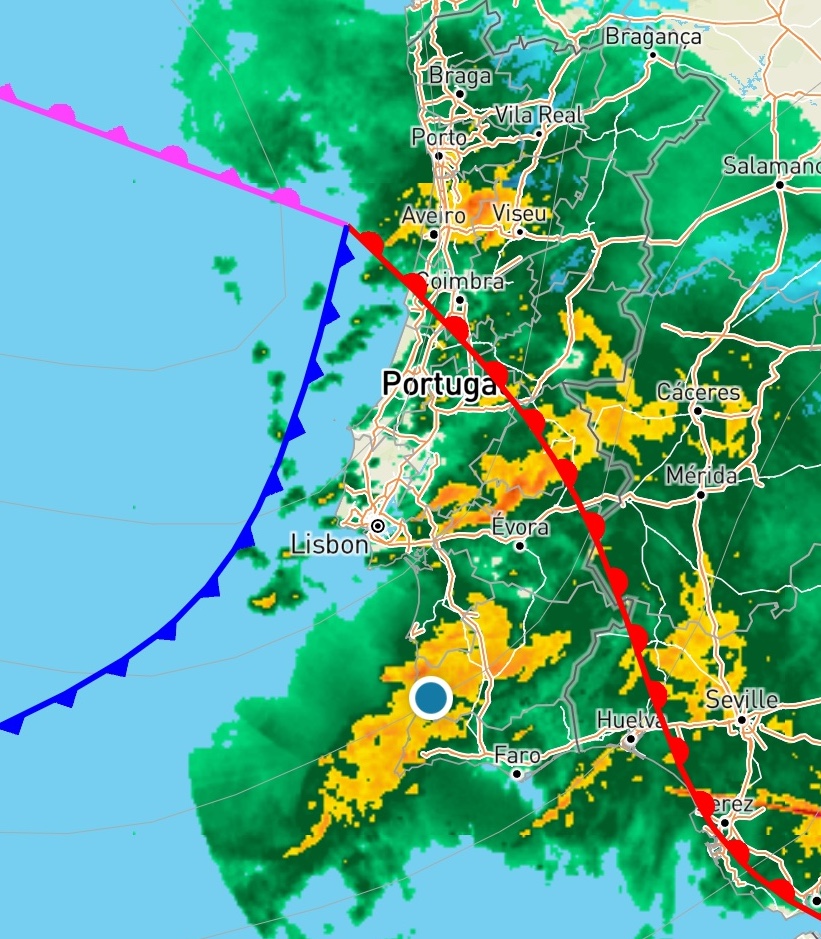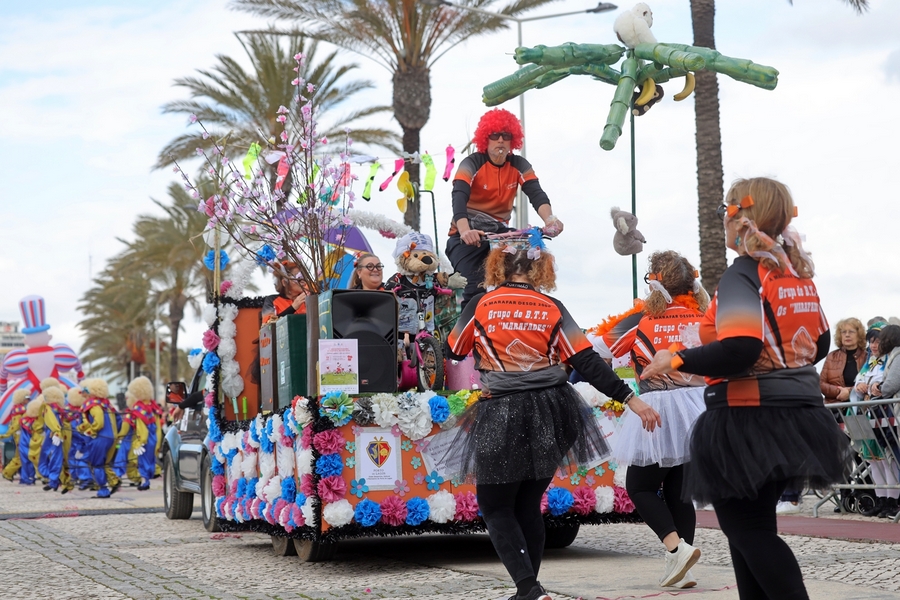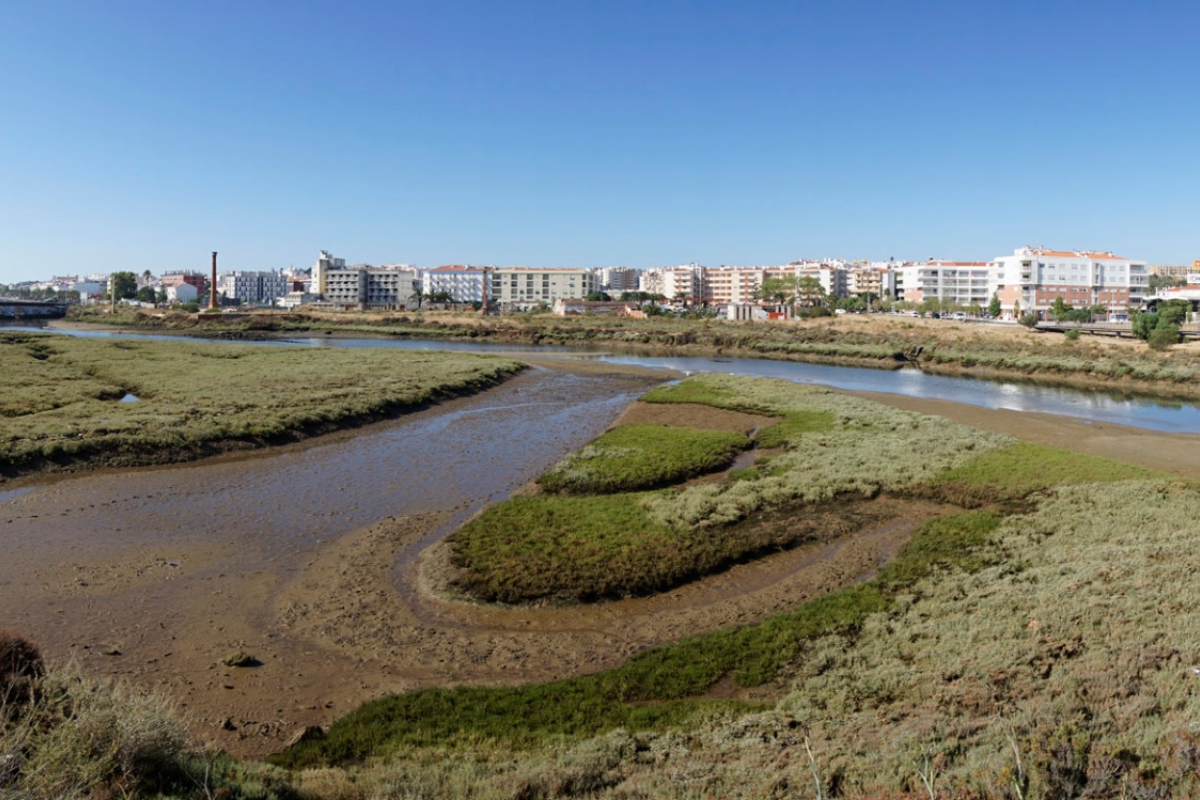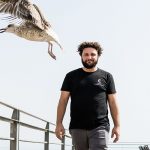By Sophie Sadler
Paul Clark is now one of the top foreign actors in China and lived a lifelong dream when he appeared in a movie with his hero, Jackie Chan. So how did Paul, who attended the old Barlavento school in Espiche, metamorphose from a skinny kid who was often bullied, into a Chinese film actor and martial arts expert? Sophie Sadler finds out in this exclusive interview.
I have met Paul several times socially. He is quiet, thoughtful and unassuming. I would never have guessed the fascinating double life he leads. When not doing the school run in the Algarve he lives the life of an actor in Chinese films.
We talk on WeChat, the only app not blocked by the Chinese government’s firewall. He is currently on location in Hengdian World Studios, where he is working on 48 episodes of a TV show. It is the largest film studio in the world and a huge tourist attraction with theme parks. Sometimes called “Chinawood,” Paul tells me it is an awesome spectacle, with mountains as a backdrop and near a huge river. One of the studio’s largest buildings is a reconstruction of the Forbidden City and they have also rebuilt downtown Shanghai.
Born in 1981, Paul’s parents moved to the Algarve in 1985 where they bought some land and built a house. His mother, a professional watercolour artist, discouraged TV and computer games so Paul and his younger sister lived a very outdoors life with a focus on exploring their creative sides. Paul was an introverted child, who enjoyed drawing, riding his bike and was in no way sporty.
As a skinny kid and a dreamer with a wild imagination, Paul was often the target of bullies but in the Algarve’s very own version of Billy Elliot, something happened in Paul’s life which was to take him on an adventure the likes of which only normally happen in fairy tales.
At the age of 12, he was exposed to Kung Fu for the first time via a Jackie Chan movie on Portuguese TV. He soon became obsessed with this ancient art form. “I remember the Teenage Mutant Ninja Turtles were also huge;” he tells me; “we went to see it at the old cinema in Luz and kids were queuing around the corner to get in. So, I guess it could have been against that backdrop that Jackie Chan resonated with me so much. I acquired VHS copies of Jackie Chan’s movies and Bruce Lee’s. I would literally watch them hundreds of times.”
At that time there was no one teaching martial arts in Lagos, so he turned his garage into a gym, where he tried to recreate the fight scenes he saw in films. He put in a punch-bag, started lifting weights and doing pull-ups on anything he could find. “I put myself through all kinds of painful stretches to develop my flexibility and eventually could do the splits which finally made me the coolest kid in the class!”
What was it about Kung Fu that so fascinated Paul? “It is different from other martial arts. It is one of the oldest forms and more visually beautiful and balletic. It puts you into a state of total focus, like meditation, it allows you to create a space in your mind which you can retreat into. Through strength, balance and discipline, you will find a feeling of inner peace. To me, it is a serious art form.”
Paul went to a boarding school in the UK for A levels and made friends with other kids who were into martial arts and after taking drama and art he thought he would follow a career as a graphic designer. Then, in a eureka moment, he decided to follow his heart and at the age of 19 booked an air ticket to Beijing.
“At that time China was like going back to an ancient civilisation. Now Beijing is an international city but back then the internet was so slow it was unusable, you had to buy phone cards to connect overseas. It was literally like landing on another planet as I couldn’t understand anyone or read a thing.”
Paul’s first stop was Shaolin Temple, believed to have been founded by Monks in the 5th century, it is considered by many to be the birthplace of Kung Fu. Paul stayed there to try to improve his skills; “It is now surrounded by schools where kids could learn martial arts. You would wake up to see hundreds of Chinese children training in temperatures of minus 10. It was like being in the army with no hot water, being fed just rice and vegetables and with 6-7 hours of training a day. I tore every muscle and soon realised this was not the life for me. I met a French guy there called Laurent who suggested we go to the Beijing Sports University which used more scientific methods of training. So, we enrolled together.”
In the University he trained 2 ½ hours per day in a more structured scientific manner focusing on nutrition and recovery, he also had lessons to learn Chinese. “There were only around 20-30 foreigners there, so we formed a really tight group. There were people from all over the world and we lived in the University district. There was just one western-style bar selling beer and western food, but we had a fun social life! It was a very good learning curve being with people from all over the world and quite a few like me had come to China because of their love of martial arts.”
“Still steeped in history with stunning temples and very few western influences it was like living in a real-life Kung-Fu movie! At that time if you had told me I would end up getting into movies, I would have laughed saying that’s an impossible dream. Truthfully it was never my goal, I was there because I loved the art-form.”
Casting directors would occasionally visit the university looking for extras; “In the same way that in James Bond movies the villains are always foreign, the Chinese always cast westerners as the villains in their films! I landed a couple of jobs that way and I would also make short films with my friends of fight scenes. We watched ourselves back and, in that way, we learnt the craft of what did and didn’t work on camera and also about editing and directing.”
“I was just 22 when I landed my first role as a featured extra in Warriors of Virtue II, then in 2003 I had a slightly larger role in Stone Moon, but after that, I did mostly modelling and around 100 TV commercials. For a guy in your ’20s, you look too young to get meaty action roles.”
China’s culture and entertainment industry has entered into an unprecedented golden age with box office revenues of RMB 44 billion in 2015 and by 2020 it is expected to reach RMB 200 billion exceeding North America as the world’s largest market in ticket revenue and audience numbers.
It was in 2012 that all of Paul’s dreams came true when he went along to an audition with a close friend of his and top screen fighter called Alexandre Bailly. They ran through a choreographed fight scene with Jackie’s stunt coordinator.
Two weeks later they were flown to Paris for filming. They were taken to Chinatown in Paris and they were given a room in a hotel which was so small two people could not stand shoulder to shoulder in the corridor. At this point, Paul believed they were involved in a hoax.
“We went down to a very basic restaurant below the hotel, where people were sat down waiting for food from the kitchen. It did not ring true that this was a Jackie Chan movie production. Someone then emerged from the kitchen and put bowls of noodles on the table. I couldn’t believe my eyes when I saw the man cooking the noodles was my childhood hero Jackie Chan. I was so starstruck. In China, he is called “Da Gu” which means Big Brother. I think he is quite literally the most famous Asian in the world and yet he is so humble and a father figure to everyone on set.”
“When I worked with him on Chinese Zodiac, he did everything. He is a workaholic and sleeps around 3 hours a night, he acts, directs, produces then cooks for everyone on set. The craziest thing is that in one fight scene we all got totally filthy and Jackie Chan came over to us with a hoover and started vacuuming the dirt off our clothes!”
Now 30, this was Paul’s first big role and the start of his film career, he explains: “The Chinese are obsessed with the colonial era, the WW2 Japanese invasion and ancient times so he said this tends to be the premise for a lot of the films so he will often get parts as the foreigners. “I mainly play roles like gang leaders, bodyguards and commanders and you aren’t credible in these roles in your ’20s.”
Just as in the UK oligarchs and business people buy football clubs, in China they buy film companies and produce TV and movies, Paul explains; “It is a sort of status symbol and sign of being hip and trendy, but only a fraction make it to Cinema or TV so I have been in many that never made it off the cutting room floor. But as a result, there are huge amounts of opportunities and it is an exciting industry.
I am keen to know how Paul copes with the lines in Chinese. He can’t read Chinese characters so has to read in Pinyin, the official romanisation system for Standard Chinese, to phonetically spell it out. He confesses it gives learning lines a whole new complexity; “I have been known to act dialogue without actually knowing what I was saying, which as you can imagine is challenging!”
It is not just Paul who is starstruck by the Kung Fu legend, many Hollywood A-listers have also begged to work with him. Paul worked on Dragon Blade, which starred Adrien Brody and John Cusack. “I watched as Adrien Brody met the legend for the first time and he kept saying; “Oh my god I am such a fan.” That is quite an accolade from a Hollywood A-lister. Adrien was really friendly and despite having huge speeches to memorise, he often talked to the extras.”
Paul explains why Jackie Chan is so iconic for so many actors. “Most fight scenes you see now in the movies are heavily influenced by Jackie’s style. Often based on Chinese martial arts, Bruce Lee first brought it to the West and Jackie Chan developed the genre. It was highly choreographed, often with a comedic element. Whenever you see household objects being used in a fight scene, it came from him.”

Paul tells me “John Cusack is a lovely guy and I got to know him quite well. He is very introverted and serious, but an incredibly focused and thoughtful actor and he is crazy about martial arts! He’s trained under the world’s most famous Kickboxer, Benny the Jet Urquidez, for over 20 years, achieving a level six black belt. We spent a lot of time talking about martial arts and even practised some sword work together.” Paul’s journey also made him cross paths with Nicholas Cage, who with a Korean wife has also branched out into Asian movies and Paul met him on the set of Outcast.
Paul is the kind of guy you want to sit down and have a drink with. His stories are so incredible, inspiring and sometimes surreal! During the filming of Stone Moon, where he played a British officer, he was on location in Myanmar in the jungle.
He recounts; “The hotel we stayed in had bats flying down the corridors. On the first day of filming, I was wearing a red bandana and got told to take it off as the Khmer Rouge had snipers in the area. The director really didn’t know what he was doing and during a battle scene they strapped rockets to the back of elephants and let them off. Of course, the poor elephants were terrified and stampeded. Luckily no one was hurt but the whole set was destroyed, and people spent hours trying to retrieve the elephants from the jungle. This could only happen in China!”
He went to one audition and was told they were recording a song. Although he confessed to not being a singer, he was told it didn’t matter as they would mime to a backing track. He was taken to the most amazing hotel the likes of which he had never seen before with its own private beach, a manmade river which you could swim along and your own bar in the room. He started wondering what was going on when the Bay was blocked by warships. Finally, they learnt what was happening. There was the annual Brics summit, where world leaders met for talks, including Putin and Hu Jintao. “It was very bizarre miming along to a backing track in front of some of the most powerful men on the planet,” Paul recalls. Paul met his Chinese wife, Ashley, at a private tutoring English school which she was managing. After having their daughter, Maian, in 2014, Paul started to get another perspective on life. “The pollution became so bad in Beijing. It’s such a shame as I love the city, but we could never go outside with Maian. One day I was sitting in a restaurant chatting to friends and we were all wearing pollution masks because if you breathe the air a layer of dust will form in your mouth and it just hit me. It was like a science fiction movie.”
Paul didn’t want his daughter exposed to the pollution and so he moved his family to the Algarve. He also thought an English education would give her more opportunities and she now attends the school Paul went to; “It is hard because I haven’t seen my family for four months. But I decided that to get to anywhere in China, as it’s so big, you have to get on a plane anyway, so I would rather get one to the Algarve!” Last year he filmed the Netflix series Into the Badlands in Ireland, in which he had a comedic fight scene with English actor Nick Frost; “I would like to work more in Europe, but I would never get the parts I do in China, I have a niche which is hard to replicate elsewhere.”
Although Paul does not benefit from the huge pay checks of Hollywood A-Listers, his earnings for six months of filming are enough for him to live off for the rest of the year, which he admits gives him a great opportunity to spend time with his family, recover physically and pursue other projects.
So, what does the future hold for Paul? “Now I am approaching 40 I can start to get the more serious parts; most male actors will do their best work around this age and of course I am hoping to land my break-out role. I have 10 years left where I can work at this physical level, so this is now my big chance.”
This article was originaly posted in the May 2019 edition.
In the 2020 lockdown film-maker, Olaf Crato and Paul teamed up to make a short film near their homes in the Algarve. The premise of the film is “a lockdown journey in the mind of Kung Fu artist Paul Clark,” and it won Best Cinematography at the New Lisbon monthly film festival 2020.
emeraldmediacreative.com
You can watch the full film here:
